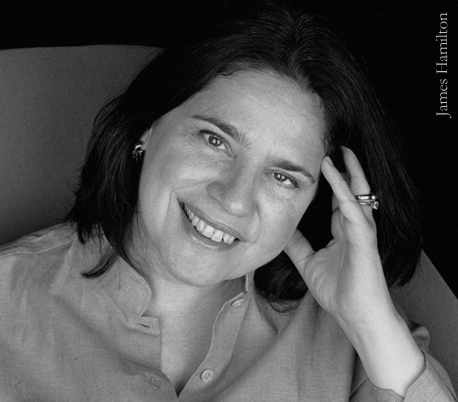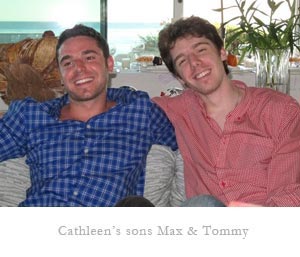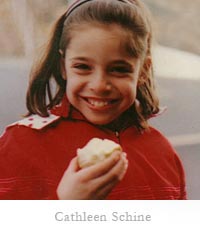
Location: New York, NY
Age: 58
Marital Status: Domestic Partnership
Education: Barnard
It may not sound like the most effective work schedule, but for Cathleen Schine, it works. We chatted with her about a potpourri of topics, including bagels, naps, French writers, and what it’s like to spend a year in the hospital.
Where are you from?
Westport, Connecticut.
Where do you live?
New York City.
Are you married?
I’m divorced, and I live with a woman who is my domestic partner, but we missed the moment to get married in California. Hopefully some day it will come again.
Sorry to hear that.
To tell you the truth, until people started saying that we absolutely couldn’t, it didn’t seem that important. But as soon as someone says you can’t do something, you start to realize it is.

Do you have children?
Max, 27, and Tommy, 23.
Where did you go to college?
I started out at Sarah Lawrence College, because I wanted to write poetry. Then as soon as I got there, I thought, ‘this is a terrible mistake, my poetry is bad.’
So I transferred to Barnard and finished up there, majoring in Medieval History.
How did you become a professional writer?
I wanted to be a writer when I was a child. When I got older I thought, ‘I’m not good enough; I think I’ll be a medievalist.’ But I was not good at that. After a couple of non-distinguished years in grad school at the University of Chicago, I came back to New York and lived with my parents. A close friend of my mother’s was an editor at the Village Voice. She saw how miserable my mother was while I was living in her guest room, and asked me to write a piece about a year I spent in the hospital. So I did. That later served as the basis for my first novel, Alice In Bed.
Tell me about your year in the hospital.
I had Crohn’s disease, and was taking Prednisone. One of the side effects is aseptic necrosis of the hips, which means your hip is kind of disintegrating. I was in the hospital for eight months, got hip replacements and then moved to the Rusk Institute, a rehab center, for the rest of that year. So half the year I was in bed, in excruciating pain, and the other half I was in a wheelchair doing rehab. Looking back, it was good. I got some material out of it. But at the time, it was pretty grim.
It sounds horrific.
I was young, and that made it easier. When I was 16, I was in a car accident and almost died. In the emergency room, I told my mother, ‘Just tell them not to throw my belt away.’ It was a new belt, and that’s what I thought of. It’s an asset, thinking you’re invulnerable even as you’re lying there in a terrible state. I think that sense of teenage entitlement got me through it.
What a youth! I used to feel very special, because I had had a broken neck and hip replacements by the age of 21. Now everyone has caught up with me. I don’t feel special at all anymore. I’m just like everybody else.
used to feel very special, because I had had a broken neck and hip replacements by the age of 21. Now everyone has caught up with me. I don’t feel special at all anymore. I’m just like everybody else.
What are you working on right now?
I’m working on a new book. Some of it takes place in 1964, so I’ve been reading old New York Times and old New Yorkers, to bring back my memory. I could do that for years, and never write the book, so I’ve stopped doing research.
Is there a theme that weaves through all your books?
Family. There are so many contradictions, so many different personalities all sort of plopped down around one dinner table. There’s a lot of possibility for humor and also sadness.
I’m also interested in how people react when they’re hit with something totally unexpected. For example, the main character in Alice in Bed suddenly can’t walk at 19. It’s not so much that it changes people; it’s that they just suck it up into their normal lives. I think that’s a real strength most of us have. You normalize the extraordinary, because you have to.
Who inspires you?
Two writers that I find very inspiring and also consoling are Anthony Trollope and Colette’s mother.
Trollope had a full-time job at the post office, and he would write a certain number of words every day and then stop. I’m able to think of this as a job, like he did, which gets me through it. If you think you’re an artist, you take yourself too seriously, and everything comes out pompous and hideous. When I think of myself as a craftsman, then I really love to write.
The other person is the French novelist Sidonie-Gabrielle Colette’s mother. When Colette was a child, her father had a library where he would do his writing every day. Her mother would just push aside the bag of flour on the table in the kitchen and write. When Colette’s father died, they looked at all the beautifully bound notebooks he had in his office, and there was nothing there. He hadn’t written a word, while Colette’s mother actually produced. It’s another example of not taking one’s self too seriously, but taking the work seriously. That’s a huge challenge.
Is there a book you’d recommend to other FOFs?
Jennifer Egan’s most recent book, A Visit from the Goon Squad, is a remarkable book I’d recommend to anybody. I also loved Major Pettigrew’s Last Stand by Helen Simonson. There’s a romance between people in their fifties, which I think is something that has not been written about much, and as anyone over 50 knows, your feelings do not go away.
What is The Three Weissmanns of Westport about?
The dissolution and rebirth of a family. I never know what a book is about until it’s finished. And even then, it takes a lot of people responding to it for me to then see. There’s usually a character I’m interested in, or a particular relationship I’m interested in, and the book grows out of that.
Favorite restaurant in NYC?
Bottino in Chelsea. There’s a very nice place on the Upper East Side called Tre Otto – best panna cotta I’ve ever tasted.
Fitness trainer?
Alan Bowers—The Alexander Technique.
Hairstylist?
The recession taught me a lot. One of the things I learned was to go to my local hairperson. So now I go to someone on the Upper East Side. It works just as well for a third as much. There are so many talented people out there that you really don’t have to worry.
Favorite website?
Andrew Sullivan’s blog, “The Daily Dish”. He’s one of the few people whom I trust. I know his prejudices and I understand them, plus he’s very smart and honest.
Visit Cathleen at www.cathleenschine.com.

